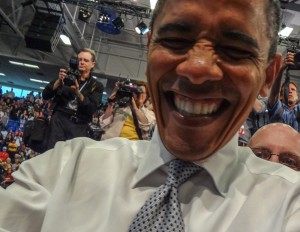
The moments before:
The excitement was building with every passing second. The Burrow, a packed basketball arena that seats 2,000 students, was loud. Louder than it had ever been. There were 3,500 people, some crammed elbow-to-elbow, others squirming in their seats. Eyes darted across the room as everyone waited for the show to begin.
Minutes passed and the podium remained empty. The section right in front of it was filled with students, most flaunting FAU’s red and blue.
Students, professors and just about anyone who managed to get a ticket came together and displayed their pride shamelessly, throwing up Owl Fingers, chanting as loudly as they could.
Thousands of spectators screamed: “Four more years!” or “O-ba-ma!” But President Mary Jane Saunders praised our school and all of its accomplishments in her introduction, and students echoed her enthusiasm with cheers. “FAU looks like America,” Saunders said. Next to her hung a navy blue and white banner reading, “An America built to last.”
The crowd was out of their seats at this point — they knew what was coming next.
And then he walked out. But not the president we had all come to see.
“Sorry for the disappointment,” Student Body President Ayden Maher cracked, as he led the crowd in the Pledge of Allegiance.
Then, after Rebecca Gaillaume sang the national anthem, the voice on the loudspeaker announced the President of the United States. You could barely hear it, not with the crowd’s thunder.
President Barack Obama strode in smiling toward the microphone.
I love you, man:
In black business slacks and a white button down shirt, light blue tie with his sleeves rolled up, the president leaned in. “Thank you!” he shouted, his words drowned out by the crowd cheering.
“I love you, man!” someone yelled.
The president replied. “I love you back!”
The students took out their phones, trying to get good shots of the president. People began taking pictures of themselves, hoping Obama would show up in the background.
From the start, he lured us in: the graduating seniors, the science majors — as if he knew our life stories.
“Pretty soon, you’ll be closing the books at Wimberly for the last time,” he said to the graduating seniors, the science majors, all of us. “Maybe you’ll be making that one last trip to the beach or Coyote Jack’s.” It was like he knew it all.
“Then comes what folks call the real world,” Obama said as he started talking about the recession. And all of us could relate as he said that he, too, had to use student loans and financial aid to make it through college.
He explained the amount millionaires and billionaires would be saving if we supported Republicans’ tax cuts. “Here’s what $150,000 means.” For students, he said, it means an improved life for everyone –– a new computer lab for FAU, medical care for one of our grandparents and a veteran, financial aid money, a year’s salary for a firefighter or police officer, a year’s worth of prescription drugs, more affordable college costs, and a medical research grant for a chronic disease.
“$150,000 could pay for all of these things combined,” he said. “Think about that.”
That’s when a guy in a blue shirt, on the right side of the audience, stood up, pounding his fist in the air, the excitement in his eyes as loud as his voice. “Yes!” he yelled over and over again.
Obama talked about justice, not just “making the rich richer.” He reminded us that wealth doesn’t “trickle down” from the top, but builds from the bottom up.
Slowly but surely, it looked like he had everyone convinced. The crowd applauded him before he could even finish a sentence. A grey-haired man standing directly in front of the podium nodded repeatedly, as if agreeing with everything he was saying.
Then he started wrapping it up, saying that we all ended up in that arena because someone felt responsible for us. And now, he said, it’s our “turn to be responsible, to preserve the American Dream.”
Here in America:
The president leaned into the microphone and his voice got louder and louder. So did the crowd.
“Here in America we don’t give up.” The shouting began to build.
“Here in America we look out for one another.” Slowly, people started getting out of their seats.
“Here in America we help each other get ahead.” The entire audience was standing, yelling, clapping. So loud they almost overpowered the speaker.
“We can make this century another great American century.” A standing ovation, an adoring audience, a deafening roar in unison.
And even if we couldn’t hear what he was saying, we could feel it.
The president came to FAU to talk about the economy, but when he flashed his Owl Fingers after his speech and the crowd flashed them back, it meant something more. They were holding them up higher than ever, prouder than ever.



















